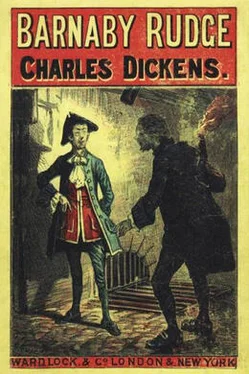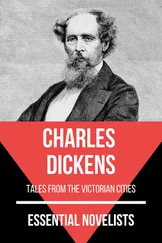The scouts reported further, that this party meeting with some others who had been at similar work elsewhere, they all united into one, and drafting off a few men with the killed and wounded, marched away to Lord Mansfield's country seat at Caen Wood, between Hampstead and Highgate; bent upon destroying that house likewise, and lighting up a great fire there, which from that height should be seen all over London. But in this, they were disappointed, for a party of horse having arrived before them, they retreated faster than they went, and came straight back to town.
There being now a great many parties in the streets, each went to work according to its humour, and a dozen houses were quickly blazing, including those of Sir John Fielding and two other justices, and four in Holborn—one of the greatest thoroughfares in London—which were all burning at the same time, and burned until they went out of themselves, for the people cut the engine hose, and would not suffer the firemen to play upon the flames. At one house near Moorfields, they found in one of the rooms some canary birds in cages, and these they cast into the fire alive. The poor little creatures screamed, it was said, like infants, when they were flung upon the blaze; and one man was so touched that he tried in vain to save them, which roused the indignation of the crowd, and nearly cost him his life.
At this same house, one of the fellows who went through the rooms, breaking the furniture and helping to destroy the building, found a child's doll—a poor toy—which he exhibited at the window to the mob below, as the image of some unholy saint which the late occupants had worshipped. While he was doing this, another man with an equally tender conscience (they had both been foremost in throwing down the canary birds for roasting alive), took his seat on the parapet of the house, and harangued the crowd from a pamphlet circulated by the Association, relative to the true principles of Christianity! Meanwhile the Lord Mayor, with his hands in his pockets, looked on as an idle man might look at any other show, and seemed mightily satisfied to have got a good place.
Such were the accounts brought to the old vintner by his servants as he sat at the side of Mr Haredale's bed, having been unable even to doze, after the first part of the night; too much disturbed by his own fears; by the cries of the mob, the light of the fires, and the firing of the soldiers. Such, with the addition of the release of all the prisoners in the New Jail at Clerkenwell, and as many robberies of passengers in the streets, as the crowd had leisure to indulge in, were the scenes of which Mr Haredale was happily unconscious, and which were all enacted before midnight.
When darkness broke away and morning began to dawn, the town wore a strange aspect indeed.
Sleep had hardly been thought of all night. The general alarm was so apparent in the faces of the inhabitants, and its expression was so aggravated by want of rest (few persons, with any property to lose, having dared go to bed since Monday), that a stranger coming into the streets would have supposed some mortal pest or plague to have been raging. In place of the usual cheerfulness and animation of morning, everything was dead and silent. The shops remained closed, offices and warehouses were shut, the coach and chair stands were deserted, no carts or waggons rumbled through the slowly waking streets, the early cries were all hushed; a universal gloom prevailed. Great numbers of people were out, even at daybreak, but they flitted to and fro as though they shrank from the sound of their own footsteps; the public ways were haunted rather than frequented; and round the smoking ruins people stood apart from one another and in silence, not venturing to condemn the rioters, or to be supposed to do so, even in whispers.
At the Lord President's in Piccadilly, at Lambeth Palace, at the Lord Chancellor's in Great Ormond Street, in the Royal Exchange, the Bank, the Guildhall, the Inns of Court, the Courts of Law, and every chamber fronting the streets near Westminster Hall and the Houses of Parliament, parties of soldiers were posted before daylight. A body of Horse Guards paraded Palace Yard; an encampment was formed in the Park, where fifteen hundred men and five battalions of Militia were under arms; the Tower was fortified, the drawbridges were raised, the cannon loaded and pointed, and two regiments of artillery busied in strengthening the fortress and preparing it for defence. A numerous detachment of soldiers were stationed to keep guard at the New River Head, which the people had threatened to attack, and where, it was said, they meant to cut off the main–pipes, so that there might be no water for the extinction of the flames. In the Poultry, and on Cornhill, and at several other leading points, iron chains were drawn across the street; parties of soldiers were distributed in some of the old city churches while it was yet dark; and in several private houses (among them, Lord Rockingham's in Grosvenor Square); which were blockaded as though to sustain a siege, and had guns pointed from the windows. When the sun rose, it shone into handsome apartments filled with armed men; the furniture hastily heaped away in corners, and made of little or no account, in the terror of the time—on arms glittering in city chambers, among desks and stools, and dusty books—into little smoky churchyards in odd lanes and by–ways, with soldiers lying down among the tombs, or lounging under the shade of the one old tree, and their pile of muskets sparkling in the light—on solitary sentries pacing up and down in courtyards, silent now, but yesterday resounding with the din and hum of business—everywhere on guard–rooms, garrisons, and threatening preparations.
As the day crept on, still more unusual sights were witnessed in the streets. The gates of the King's Bench and Fleet Prisons being opened at the usual hour, were found to have notices affixed to them, announcing that the rioters would come that night to burn them down. The wardens, too well knowing the likelihood there was of this promise being fulfilled, were fain to set their prisoners at liberty, and give them leave to move their goods; so, all day, such of them as had any furniture were occupied in conveying it, some to this place, some to that, and not a few to the brokers' shops, where they gladly sold it, for any wretched price those gentry chose to give. There were some broken men among these debtors who had been in jail so long, and were so miserable and destitute of friends, so dead to the world, and utterly forgotten and uncared for, that they implored their jailers not to set them free, and to send them, if need were, to some other place of custody. But they, refusing to comply, lest they should incur the anger of the mob, turned them into the streets, where they wandered up and down hardly remembering the ways untrodden by their feet so long, and crying—such abject things those rotten–hearted jails had made them—as they slunk off in their rags, and dragged their slipshod feet along the pavement.
Even of the three hundred prisoners who had escaped from Newgate, there were some—a few, but there were some—who sought their jailers out and delivered themselves up: preferring imprisonment and punishment to the horrors of such another night as the last. Many of the convicts, drawn back to their old place of captivity by some indescribable attraction, or by a desire to exult over it in its downfall and glut their revenge by seeing it in ashes, actually went back in broad noon, and loitered about the cells. Fifty were retaken at one time on this next day, within the prison walls; but their fate did not deter others, for there they went in spite of everything, and there they were taken in twos and threes, twice or thrice a day, all through the week. Of the fifty just mentioned, some were occupied in endeavouring to rekindle the fire; but in general they seemed to have no object in view but to prowl and lounge about the old place: being often found asleep in the ruins, or sitting talking there, or even eating and drinking, as in a choice retreat.
Читать дальше












